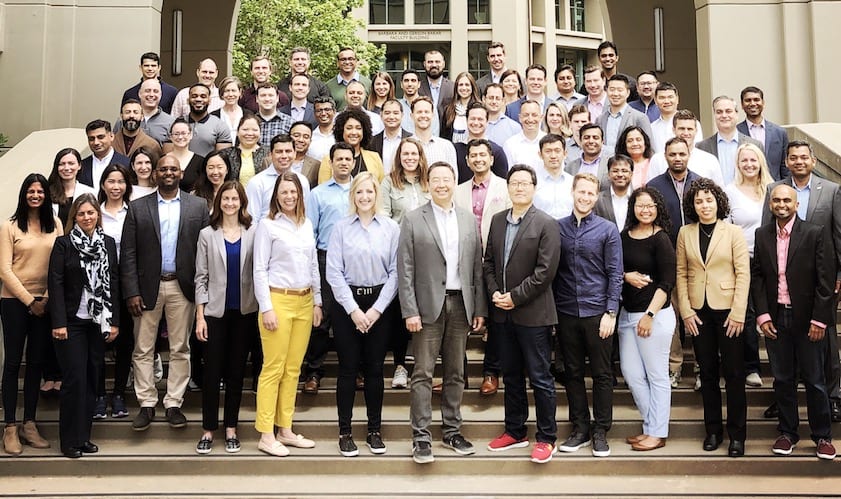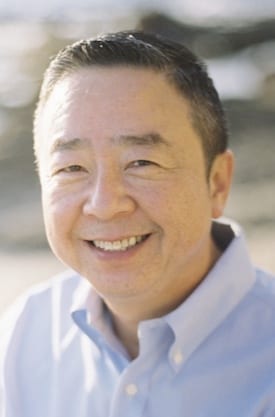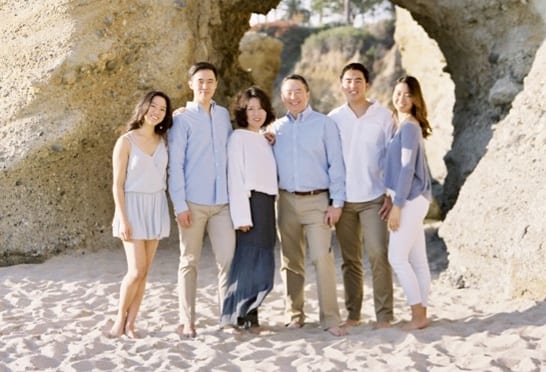In honor of Asian Pacific American Heritage Month, we’re featuring profiles and interviews with members of our Haas community.

Twenty years after founding 180 Snacks, a healthy snack company he started up in his kitchen, Michael Kim, EMBA 20, decided to seek a formal business education. His goal was to leave his $30 million company in good shape for his children.
Kim, who arrived in the U.S. from Korea as a child and attended UCLA as an undergrad, launched 180 Snacks in 1998 for personal reasons: to feed his four kids an alternative to the sugar-packed Twinkies, Hostess donuts, and candy bars that he grew up with. The trick was making his snacks not only healthy but delicious. Today, the Anaheim-based company’s products—organic Almond Square Crunch, Pistachio Squares, Nut & Seed Crunch, and the latest, the Skinny Rice Bar—are sold online and at big retail chain stores including Costco, Trader Joe’s, and CVS.
We spoke with Kim about his childhood as an Asian immigrant, the hurdles he faced, and why he enrolled in the Berkeley MBA for Executives Program.
Where did you grow up and what was your experience growing up Asian in your community?
I was born in Seoul, Korea, and lived there until I was 10 years old, when my parents emigrated to Southern California. I lived in many places as a kid, usually in the rougher area of Los Angeles. We were a typical Asian American family. My parents went through tough times, working 12 hour days, carrying multiple jobs, and they finally managed to own and operate a small beauty supplies shop. Growing up in America was tough, mainly due to racial discrimination, but I was determined to make the best out of the cards I was dealt.

Did you learn about Asian American history at all in school?
No. When I came to the U.S. in the early 1970s, as many Asian families did, Asian history wasn’t of interest yet in schools. As part of the first wave of new immigrants, my parent’s priority for their children was to assimilate by making sure we learned English and adapted to American culture quickly. They believed that was the expressway to college and the guaranteed path to success in America.
You have four children in their 20s. Was their upbringing different from yours?
They were all born in the U.S., so their first language, unlike mine, was English. They grew up in Southern California, surrounded by a large Asian population, so it was very competitive—in fact, too competitive—so we moved to Mission Viejo, California, to give them a more normal childhood. My two sons have since graduated from university (UC Irvine and UC Berkeley) and I have two daughters who are still in school (at Wellesley College and UC Riverside). My children understand about 90 percent of spoken Korean, but they can only speak about 40 percent. They’re working on it!
Why is that important to you?
As a Korean American, I believe that understanding the mother language and ancestry is of paramount importance. I want my children to know that they are 100% American and, at the same time, they are 100% Korean. We take many trips to Korea and to many other Asian countries so that the Asian heritage is ingrained in their identity, alongside their pride in being American. I am the 29th generation of the Kim family and I want my children to be proud to be the 30th generation, and for their children to be the 31st generation of the Kim family.

How did 180 Snacks break into Costco?
It started in the Fall of 1998 when I approached the regional Costco buying office, at a time when being an Asian American and selling to the mainstream U.S. market was not so well received. When I got there, they saw a young Asian fellow and said, “Delivery is in the back.” They assumed I was a delivery guy because I wasn’t white. However, after the meeting with the buyer and some trial sales, my product was well received. The real shocker came when the buyer gave me a whole truckload for an order, which was impossible for me to fulfill. My journey into the world of Willy Wonka’s snack factory had become real.
What brings you back to get an MBA after running a successful business for years?
With my company, I did everything instinctively. I came back here to see if I did it right—so this is more of a confirmation for me. My sons Timothy and Eugene are now training with me to be the company principles. But we’re a small family that sells to major chains so I want to make sure that when I leave this company everything is set up the way it should be. At Berkeley Haas, I am wearing different shoes than the rest of my cohort. So many people here want to be entrepreneurs and live the American dream. I hope that my experiences encourage future entrepreneurs, and that I can be a reference and share my experiences. This is just one small way I can give back.
Who are your Asian heroes?
I read a lot of Confucius and Taoist teachings growing up. The teachings of these great teachers share many similarities with our Berkeley Haas Defining Leadership Principles: Question the Status Quo, Confidence Without Attitude, Students Always, and Beyond Yourself.